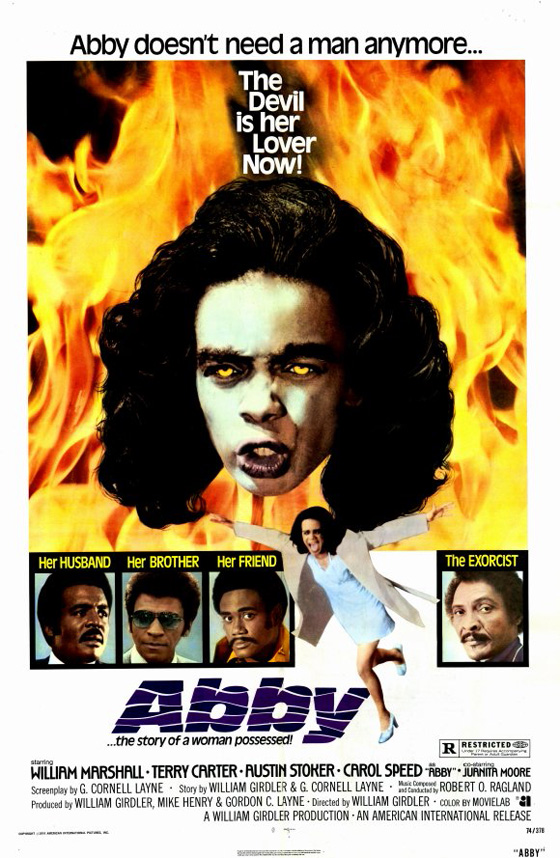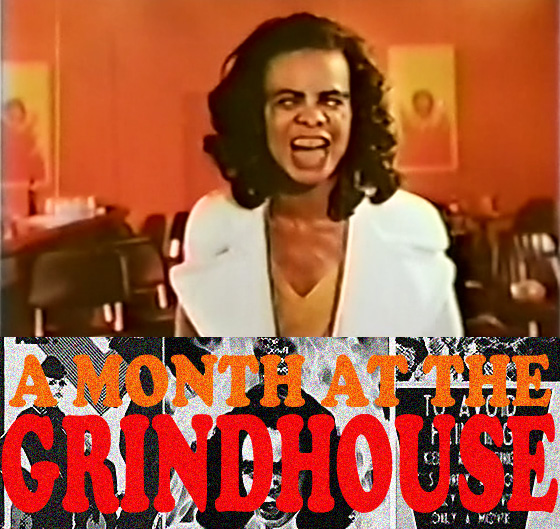
It’s rare that a major studio takes legal action to have a film withdrawn from circulation and actually wins the lawsuit. It happened when Film Ventures International was sued by Universal for their release of the Italian film Great White (L’ultimo squalo, 1981) and its close similarities to Jaws (1975), and it happened with Abby (1974), an American International Picture which gave a blaxploitation spin to Warner’s The Exorcist (1973). Samuel Z. Arkoff of AIP didn’t fight the lawsuit; the low-budget horror film had already raked in approximately four million dollars. Perhaps this goes back to Jack Hill’s complaints about AIP (see: Coffy) and their factory approach to creating films: directors don’t matter, keep the budget low, turn a profit. Abby, having done her duty, was sacrificed…and disappeared. Well, not entirely. Bootlegs circulate from a 16mm print, washed-out, beaten-up, with muddy sound and lots of sticky grindhouse charm. The subpar presentation only adds to the home movie feel of the project. (Hey, let’s get some friends together and make our version of The Exorcist!) Really, Warner’s complaint is absurd. Although Abby undoubtedly lifts from their film – some lines seem taken verbatim, and the notion of using “subliminal” images of the demon’s face are poorly copied using some Halloween-mask-style goblin makeup – Arkoff could easily have argued the film was a satire, and therefore protected. A jury would have to agree. Even if the satire was accidental, the film is far too much of a ridiculous romp to lay claim to William Friedkin territory.
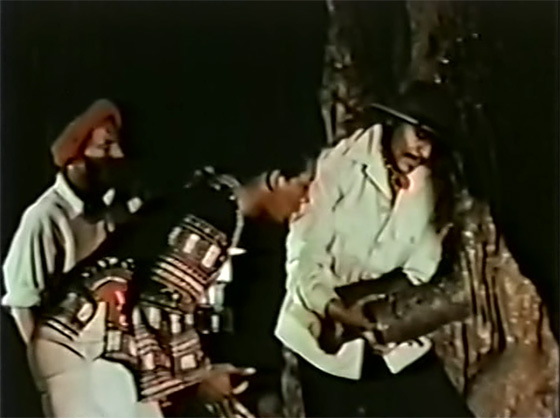
In a Nigerian cave, Bishop Garnet Williams (William Marshall) discovers an ancient vessel which contains the spirit of a Yoruba demon.
The film was shot in Louisville, Kentucky, by the Louisville-based schlock auteur William Girdler, who had previously made Three on a Meathook (1973) and The Zebra Killer (1974), and would go on to direct the notable B-movies Sheba, Baby (1975, with Pam Grier), Grizzly (1976), and The Manitou (1978) before his tragic death in a helicopter crash at age 30. Girdler recruited William Marshall of Blacula (1972) fame to take on the Max Von Sydow role in Abby as Bishop Garnet Williams. Terry Carter (Foxy Brown, Benji) was cast as his son, the Rev. Emmett Williams; Austin Stoker (Battle for the Planet of the Apes) as Abby’s brother, Detective Cass Potter; Juanita Moore of Douglas Sirk’s Imitation of Life (1959) as Abby’s mother; and, as the object of demonic possession, the cute, energetic Carol Speed of The Big Bird Cage (1972) and The Mack (1973). Rather than taking an ominous Tubular Bells approach, the soundtrack instead consists of funk, gospel (Speed herself wrote the song she sings in the choir scene, “My Soul is a Witness”), and a dreary Carpenters-style number called “Will We Find Our Tomorrows.” The plot admirably twists The Exorcist a little bit: the demon, Eshu, is taken from the mythology of the Nigerian Yoruba culture, a trickster spirit often identified with Death. But Marshall, who claimed he added more Yoruba elements when he found the script unsatisfactory, spends the first half of the film in Nigeria in scenes which openly mimic Von Sydow’s introduction in The Exorcist. After smugly observing Eshu’s large erection on a sealed vessel he’s unearthed, he accidentally frees the spirit, who then takes vengeance on his family in Louisville, possessing Abby in the shower, where she writhes orgasmically (though somewhat chastely – there’s no nudity in the film). Soon Abby speaks with the voice of Eshu (voice actor Bob Holt, Avatar from Ralph Bakshi’s Wizards), and she begins sexually taunting her beleaguered husband: “I’m not your ho. You ain’t got enough to satisfy me, you impotent son of a bitch!”
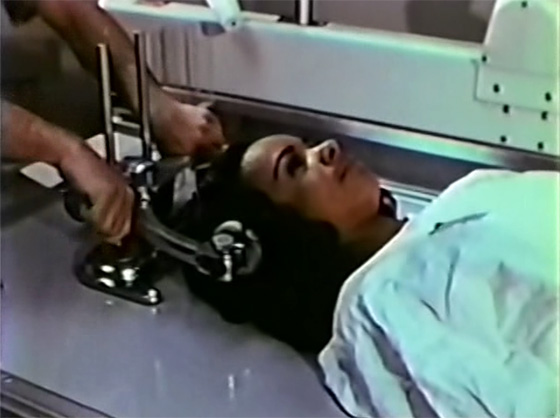
Abby gets x-rayed, in one of the many parallel scenes to "The Exorcist."
The contrast between old Abby and new Abby couldn’t be sharper, because she’s deliberately introduced as a church-going goody two-shoes. The dialogue takes pains to make sure the audience understands that:
Emmett: Hey, Momma. Did you know that Abby got her certificate for marriage counselor?
Momma Potter: Oh, really? On top of the youth program and working with the junior choir?
Abby: Oh, Momma, stop it, now you’re gonna make me too proud!
In one of the funniest moments, Abby is counseling a young married couple when her voice suddenly deepens – “All men are not created equal. Better make sure what he’s got first!” – and she rips her shirt open to flash them. During one of her husband Emmett’s sermons, she starts coughing and gagging, and is escorted out back, where she starts throwing people around with Hulk-like strength. Emmett’s efforts to control her usually end with objects flying about and people being flung into corners. She’s hospitalized and x-rayed just as Linda Blair was, then breaks out of the hospital in a rampage. Emmett’s father arrives, but is unable to stop her, and she heads out to downtown Louisville for a night of drinking, dancing, and seducing church boys. While Emmett, in pursuit, commandeers an old lady’s car, Bishop Williams summons Abby’s cop brother Cass and tells him, “There are hostile forces…and they have to be eliminated tonight, or she’ll die.” We know that the bishop is the man for the job, because some dialogue at the beginning of the film read us his credentials:
Bishop Williams: I’ve been researching the Yoruba religion in Nigeria for several years now, and I’m just beginning to realize how little I know about it.
Student: Oh, come on now, I mean honestly, how can a man with your intellect, your background, you know, a worldwide traveler, an archaeologist, a humanitarian with a doctorate in Theology, with a PhD…
Bishop: Ben, it’s getting a little thick and heavy. You know, I’m beginning to think that you’ve spent most of your time researching me!
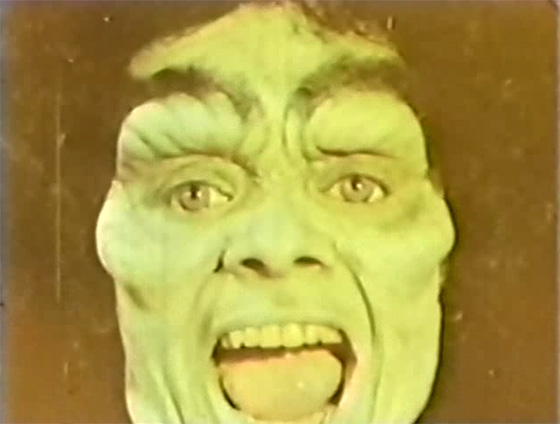
One of the "subliminal" images of the demon.
At a downtown bar with a disco ball and a number of characters who look like pimps, Abby picks up pious young friend-of-the-family Russell (Elliott Moffitt) and screws him to death in a limousine…I presume, since we just see the limo rocking back and forth while sulfurous smoke billows out the windows. Her attempt to do the same with every man in the tavern is interrupted by Emmett, whom Abby has pinned to the bar by her new lackeys: “Let’s play ‘Strip the Preacher’!” she screams. His rescue by Cass triggers a bar fight, and Abby tearing her way through the crowd until the place is emptied out, setting the stage for the film’s long-awaited, appropriately boozy exorcism scene. Bishop Williams dons some traditional Yoruba garb and urges Cass and Emmett not to listen to the demon’s lies. You know the drill. Eshu takes on Abby’s voice and pleads for Emmett to help her; the demon and the exorcist have a verbal showdown (he challenges her linguistic skills); white goo dribbles out from her lips. Smoke and fire erupt at the climactic moment, and a smoldering disco ball turns into a wrecking ball, helping smash the bar to pieces. The film is really just another in a line of blaxploitation takes on horror subgenres, not much different from Blacula or Blackenstein (1973). The only difference is this one was riffing on a copyrighted property. To quote Emmett, “Abby, whatever possessed you to do a thing like that?”
